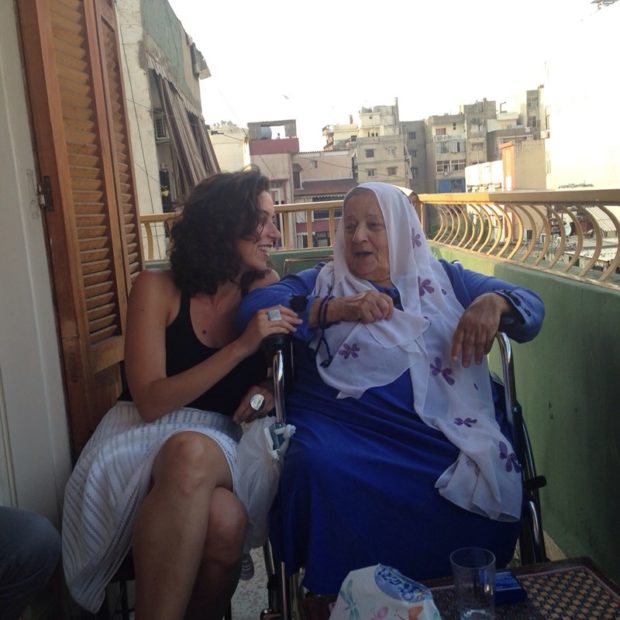You have no items in your cart. Want to get some nice things?
Go shoppingWhen I was young, I sometimes wished I had a grandmother like the one I read about in my French books and saw on TV, the white-haired lady in a grey shirt and plaid skirt who bakes cookies and reads her grandchildren stories before bed. My teta loved to tell stories to her eight children and eighteen grandchildren, but hers were nothing like bedtime ones. She related tales of people from the village, of women who were beautiful when young but turned dour by bad marriages, of men traumatized for life by nasty childhood bullying, of divorces and miscarriages and fingers lost and children who immigrated and never came back. My brothers and I teasingly referred to these as the stories of “Hassan and Hussein” – the two most common names among Shiites, and often given to siblings.
I left home when I was twenty, traveling to the US for my doctorate, and struggled, as emigrants do, with the question of belonging. I grew accustomed to carrying a part of home with me across the world. I connected with my parents, brothers, and friends through email and social media. I followed the news from Beirut, which always keeps us on our toes – a city that does not like to be forgotten. And I assiduously read the Arabic novels that my mother and my friend Farah would give me on my visits, fearing that I would gradually lose my mother tongue. But there is another part of home, more expansive and elusive, which did not travel so well: childhood memories in the village, family lunches on holidays, extended family that I both feel attached to and alienated from, my parents’ stories about their own childhood. That part coalesced around the personage of teta. As the years passed, she became the only grandparent I had left, the only thread that connected my cosmopolitan life to that lineage extending from a remote village in the south of Lebanon. As I have often been in the US for Eids, my experience of the holiday revolved around calling her. She would inevitably rush the conversation, unpersuaded that international phone calls were no longer expensive.
A few weeks before my wedding in Lebanon two years ago, teta died. Just as with the death of other family members in the years since I left home, I received the news by way of a text message from my father, sent to me and to my older brother who also lives in the US: “Teta passed away, in the hospital. She lives on in your lives.” My first reaction was surprise mixed with incomprehension. Here I was, alone in my small apartment in Washington DC, with a message on my phone that informed me of a deep loss that I had just incurred, but which had no material effect on anything in the universe around me. I had to summon up a memory – my teta’s smiling, tranquil face as she sat on the couch in her living room surrounded by family – to bring myself to cry.
She died early enough for her mourning period to run its course before any celebrations were due to commence. Yet, it was only later, after I got over the idea of not having her there, that I recognized the gentleness of her exit and the fact that it made way for my celebrations. Even then, and even though I had known her death was near and inevitable, I had bestowed her presence at the wedding with so much existential meaning that it was impossible not to be rattled by it.
The year before she died, I had gone home for the summer vacation, which is when I introduced her to my partner, Kevin. We visited her apartment, in the southern suburbs of Beirut; she and Kevin exchanged a few words, as much as such an encounter, across worlds and generations, makes comfortable. Disbelieving his fluency in Arabic, which must have been peculiar to her, she turned to me, in the middle of the conversation, to comment that he had a handsome face. Then, right after, in the typical manner of Lebanese mothers (praise only paving the way for critique), she commented reprovingly, albeit lightheartedly, that he looked younger than me.
She did not mind that I was to marry a foreigner. Though a devout woman, she did not object to her children and grandchildren marrying non-Muslims, and had never protested a short skirt or alcohol in her house. Admittedly, what concerned her at that point was that I, being in my thirties, got married at all. The only serious protest she made concerned timing; why wait a whole year for the wedding, she insistently asked. The idea that she foresaw her own death did not occur to me; I highly doubt that this was what worried her in any case. But it is difficult for me now to dismiss the possibility of a premonition.
I have a picture of the two of us from that day, sitting on her balcony. She is wearing a long-sleeved blue dress and a long, untied white veil decorated with purple flowers, purple prayer beads in hand, and is laughing at something. I am wearing a black tank top and a knee-length white skirt, and lovingly looking at her. Our dress and demeanor could not have been more different, the stereotypical contrast between tradition and modernity. Yet I treasured the idea of being her descendant, however immense the difference between our lives. For her part too, she had always tried to catch up to the times. Although she had never learnt to read or write, she loved to imitate her visitors in interspersing foreign words in her speech. She would say cellular, minimum, internet, autostrade, baby, and foyer, mispronouncing all of these with endearing confidence. She once even ended a phone conversation with me with “I love you,” a custom foreign to the Lebanese who, while incessantly using words of endearment, find the standalone “I love you” a bit too dramatic. I wondered if she had been inspired by one of the Arabic-dubbed Mexican and Turkish soap operas she watched every day with her Ethiopian maid.
In her last years, when I was in Beirut and would join my father on his Monday evening visits to her, I had started asking her about her life. She recalled memories of her wedding, at sixteen, of a freshly-painted chair that her father gave her as a wedding gift and which stuck to her white dress, of a donkey that carried her to my grandfather’s village and which she was not supposed to dismount until she reached her new home, and of the sadness of leaving her loving parents.
I left home long before I married. While teta’s marriage involved her leaving her village to go to my jeddo’s, my marriage was only the culmination of the journey. I have always longed for a return of sorts. And yet I married an American and was not likely to have children for whom the story of Hassan and Hussein, which my brothers and I had learnt over many weeping mourning rituals, would mean much. For her to bless the marriage was in my eyes tantamount to bestowing on it the symbols of continuity with the past, however illusory these might be. What she left me with instead was a challenge, that of figuring out how exactly to embody the Arabic adage that she lives on in my life.


About Loubna El Amine
Loubna El Amine is from Beirut, Lebanon, and teaches political theory at Northwestern University. Her research and teaching focus on ancient Chinese political thought, but she also writes on the question of "East and West" more broadly. Her essays have appeared in The Boston Globe Magazine, The Chicago Tribune and The Chronicle of Higher Education, as well as in Arabic outlets.
- Web |
- More Posts(1)



